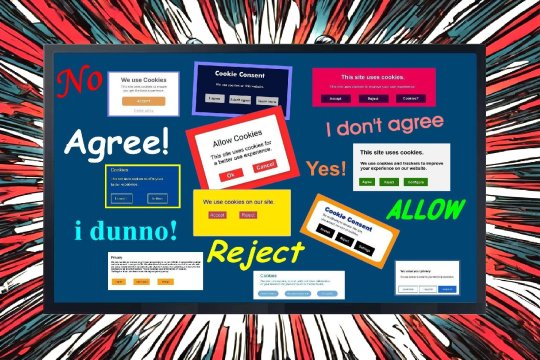#personal data
Text
We ask your questions so you don’t have to! Submit your questions to have them posted anonymously as polls.
#polls#incognito polls#anonymous#tumblr polls#tumblr users#questions#polls about the internet#submitted nov 30#internet privacy#internet security#online safety#online privacy#internet safety#ad blocking#data#personal data
442 notes
·
View notes
Text
Q: "analyze all of my Gmail and tell me, with reasonable certainty, what my biggest psychological issues are"
12 notes
·
View notes
Text
Tried to escape from a user data scraper, ended up in another one!
Hopefully Bluesky isn't, in fact, a user data goldmine for artificial intelligence ROFL
Seriously it's fucking hilarious that the latest Tumblr controversy (alongside the very unfortunate situation with the CEO of Tumblr, which is not hilarious btw) is regarding AI!
2 notes
·
View notes
Text
'World's biggest casino' app exposed customers' personal data | TechCrunch
#privacy#invasion of privacy#casino#apps#app#personal data#internet#security breach#breach#ausgov#politas#auspol#tasgov#taspol#australia#fuck neoliberals#neoliberal capitalism#anthony albanese#albanese government#classism#class warfare#class war#capitalism#anti capitalist#capitalist hell#capitalist dystopia#capitalist bullshit
2 notes
·
View notes
Text
The European Commission has announced a pact with the US to allow easier legal transfer of personal data across the Atlantic.
Data privacy activists vowed to challenge the agreement in court.
President Joe Biden and EU officials welcomed the deal, which overcame objections about US intelligence agencies' access to European data.
The deal ensures Meta, Google and other tech giants can continue sharing information with the US.
...the rest of the article go to hotlink in title
2 notes
·
View notes
Link
“Under federal rules taking effect Thursday, [October 6, 2022] healthcare organizations must give patients unfettered access to their full health records in digital format. No more long delays. No more fax machines. No more exorbitant charges for printed pages.”
11 notes
·
View notes
Text
The internet wants to provide a personalized experience, so it needs to know who you are. It does this through the algorithms that are programmed within it, which are designed to figure out what you like based on information such as the sites you visit, the links you follow and the things you share.
This is the data that will determine what content you are then exposed to. As you provide companies like Google and Facebook with more data, they in turn refine the content that is provided to you. But since you’re the one providing the data, you’re also the one shaping the internet you interact with.
And remember: the internet also shapes you.
As the content you’re exposed to becomes more personalized, the array of topics and ideas you’re exposed to becomes more limited, thereby influencing your perception and your identity.
Self-fulfilling prophecies occur by creating a reinforcing loop between belief and behavior. The internet, by creating a you loop, essentially creates self-fulfilling identities. The “you loop” starts when Facebook and Google get their initial idea of who you are from limited data removed from any context. This is Google’s theory of you, and it might be based on your general interest in science and a couple movies you liked. Of course, it is nothing like the real you, since your identity is much more than a taste for science and a handful of films.
Nevertheless, they’ll use this information to suggest specific internet communities as well as news and ads that align with these highly specific aspects of your identity. And there’s a good chance that you’ll end up clicking on one of these things and confirming Google’s theory, thereby prompting more science-related content. In this way, the internet begins subtly molding your personality.
#book: filter bubble#psychology#manipulation#personal data#data#algorithm#personalization#social media#google
1 note
·
View note
Text
This is not a main blog. It is run by one or more adults who are well versed in art.
Nobody needs to know anything personal, at all, about us. This blog will most likely not interact with you. Rest assured, we tolerate no cruelty, oppressive attitudes, narrow-mindedness, nor creepy, petty, or intrusive behavior.
An age posted on a blog says nothing because it proves nothing. It accomplishes nothing beyond exposing personal data (or false data) and therefore protects neither blog nor audience from anything. Thinking that I know others' ages accomplishes nothing. Am I looking for a sense of moral propriety or control? These are illusions.
#bio#age in bio#personal data#exposed personal data#peer pressure#illusions#illusion of safety#ruse#hoax#this platform is swarming with bots. likely harvesting untold amounts of data. and thousands of blogs are posting the age of their users.
2 notes
·
View notes
Text


Kids, remember to remove all data storage from your eBay items.... (Döglött telefont meg inkább szettorve kihajtani, az a minimál összeg nem éri meg ha eladod, hacsak nem tudod szétszedni, mert ügyes emberek kibanyaszhatjak a mindent is róla)
Ugyanitt - ebből a laptop szériából már van vagy 2, mind untested meg spares, azt kiderül h semmi bajuk ... (ehhez mondjuk nem járt töltő)
31 notes
·
View notes
Text

3 notes
·
View notes
Note
from your tumblr live reblog: which tab in blokada can you use to block specific domains? having trouble here
(Referring to this post on blocking Tumblr Live and protecting your personal data)
When you launch the Blokada app, there should be 4 tabs at the bottom. The 2nd from the left has a symbol like a bar graph, and when you tap on it it's labeled "Activity." On this tab, you should see a real-time list of domains that your phone is connecting to. (There will be a red symbol by each that is blocked, and a green symbol for each that is allowed). This is where you can tap on a domain, which pulls up the option to tap "Add To Blocked." That's what you're looking for 👍
#Blokada#Adblock#Adblocking#Tumblr live#Block tumblr live#Block ads#UBO#Ublock#Ublock Origin#Dns#Dns adblocking#VPN#Netguard#Tumblr#Data privacy#Data security#Infosec#Privacy#Personal privacy#Personal data#Online privacy#Right to privacy
6 notes
·
View notes
Text

View on Twitter
Even Facebook’s own engineers admit that they are struggling to make sense and keep track of where user data goes once it’s inside Facebook’s systems.
(Source)
8 notes
·
View notes
Text
Data Brokers and the Sale of Americans’ Mental Health Data
The Exchange of Our Most Sensitive Data and What It Means for Personal Privacy
Authored by Joanne Kim,
Sanford School of Public Policy - Duke University
(Full report made available online)
Overview:
This report includes findings from a two-month-long study of data brokers and data on U.S. individuals’ mental health conditions. The report aims to make more transparent the data broker industry and its processes for selling and exchanging mental health data about depressed and anxious individuals. The research is critical as more depressed and anxious individuals utilize personal devices and software-based health-tracking applications (many of which are not protected by the Health Insurance Portability and Accountability Act), often unknowingly putting their sensitive mental health data at risk. This report finds that the industry appears to lack a set of best practices for handling individuals’ mental health data, particularly in the areas of privacy and buyer vetting. It finds that there are data brokers which advertise and are willing and able to sell data concerning Americans’ highly sensitive mental health information. It concludes by arguing that the largely unregulated and black-box nature of the data broker industry, its buying and selling of sensitive mental health data, and the lack of clear consumer privacy protections in the U.S. necessitate a comprehensive federal privacy law or, at the very least, an expansion of HIPAA’s privacy protections alongside bans on the sale of mental health data on the open market.
Key Findings:
Some data brokers are marketing highly sensitive data on individuals’ mental health conditions on the open market, with seemingly minimal vetting of customers and seemingly few controls on the use of purchased data.
26 of the 37 contacted data brokers responded to inquiries about mental health data, and 11 firms were ultimately willing and able to sell the requested mental health data.
Whether this data will be deidentified or aggregated is also often unclear, and many of the studied data brokers at least seem to imply that they have the capabilities to provide identifiable data.
The 10 most engaged data brokers asked about the purpose of the purchase and the intended use cases for the data; however, after receiving that information (verbally or in writing) from the author, those companies did not appear to have additional controls for client management, and there was no indication in emails and phone calls that they had conducted separate background checks to corroborate the author’s (non-deceptive) statements.
The 10 most engaged brokers advertised highly sensitive mental health data on Americans including data on those with depression, attention disorder, insomnia, anxiety, ADHD, and bipolar disorder as well as data on ethnicity, age, gender, zip code, religion, children in the home, marital status, net worth, credit score, date of birth, and single parent status.
Pricing for mental health information varied: one data broker charged $275 for 5,000 aggregated counts of Americans’ mental health records, while other firms charged upwards of $75,000 or $100,000 a year for subscription/licensing access to data that included information on individuals’ mental health conditions.
One company that the author was in contact with depicted their firm as an advertising tech firm. The sales representative offered to ask their manager about coordinating a data deal on information from organizations they advertise for on behalf of the author.
Data broker 1 emphasized that the requested data on individuals’ mental health conditions was “extremely restricted” and that their team would need more information on intended use cases—yet continued to send a sample of aggregated, deidentified data counts.
After data broker 1 confirmed that the author was not part of a marketing entity, the sales representative said that as long as the author did not contact the individuals in the dataset, the author could use the data freely.
Data broker 2 implied they may have fully identified patient data, but said they were unable to share this individual-level data due to HIPAA compliance concerns. Instead, the sales representative offered to aggregate the data of interest in a deidentified form.
Data broker 4 was the most willing to sell data on depressed and anxious individuals at the author’s budget price of $2,500 and stated no apparent, restrictive data-use limitations post-purchase.
Data broker 4 advertised highly sensitive mental health data to the author, including names and postal addresses of individuals with depression, bipolar disorder, anxiety issues, panic disorder, cancer, PTSD, OCD, and personality disorder, as well as individuals who have had strokes and data on those people’s races and ethnicities.
Two data brokers, data broker 6 and data broker 9, mentioned nondisclosure agreements (NDAs) in their communications, and data broker 9 indicated that signing an NDA was a prerequisite for obtaining access to information on the data it sells.
Data broker 8 often made unsolicited calls to the author’s personal cell. If the author was delayed in responding to an email from data broker 8, the frequency of calls seemed to increase.
Some brokers imposed data use limitations on the possible sale of people’s mental health information, ranging from “single-use” (which usually pertains to mailing purposes) to “multi-use” (which means the dataset is available for one year after purchase) based on the firm and the product purchased.
Based on an evaluation of privacy policies, data brokers seem collectively less willing to provide access and disclosure to their customers and users about the collection or correction of personal data.
#privacy#privacy rights#data brokers#mental health#personal data#consumer privacy#data resellers#information broker#digital privacy#online safety
1 note
·
View note
Text
Just saw an ad for Apple watch saying it can track your stride length, can tell if you're doing a backstroke or breaststroke, can tell if you're dreaming, can tell if you're ovulating, and I'm going to build an EMP
Technology was a mistake
1 note
·
View note
Text

Cookies Pop-Ups - Annoying Impact on Your Productivity
How intrusive cookies consents keep distracting you and decrease your work performance. Let´s discuss how to stop annoyance and reclaim efficiency.
Cookies are data packets or computer files to store data about the website visitors on their computers. Simply put, they are little bits of data that allow an internet browser to track information about you, such as your internet search history, your purchases, your browsing activities, etc.When you accept cookies, you are authorizing that website to track and store that information.
But, very differently from the cookies we all know, the popular baked treat, the computer version can become a real nuisance, especially if you visit many websites a day on a daily basis.
Laws have been created all around the world to protect users' privacy rights. Most of these laws can punish websites with heavy fines. Hence, we can assume most websites comply with the established rules.
In some cases, the cookie is written before you even read the notice and before you decide to agree or disagree with the use of cookies. Some third-party cookies, like paid advertising or analytics, are executed before the website page is shown.
Besides, the way the cookies consents were implemented constitute an undeniable waste of time, especially affecting those who use their computers and the internet to work.
Necessary cookies make the websites work correctly and allow them, for instance, to remember visitors, shopping carts, and page navigation. But this kind of cookies do not store personal data. Yet, a large quantity of cookies pop-ups asking for consent can also raise users' suspicion about a site's real purposes.
The fact is that the repetitive and excessive clicking, "allowing" and "confirming" the same thing so many times, answering "yes" to the very same question, is very annoying and disturbing, and it completely disrupts the user's flow, decreasing their performance and harming the results of their work because of all those intrusive interruptions as each website is visited.

designed by FreePik
In addition, we can also think of this pop-up messages as an additional barrier to obtaining the desired information. And it can be even worse on smartphones and other mobile devices, with limited screen area and a narrower keyboard. Small buttons to accept or decline cookies can also lead to wrong clicks, causing even more stress and nuisance.
Data protection and user privacy are extremely important, of course. But the internet is not a safe place! And people are aware of that and understand that websites collect information about them. Hackers, stolen passwords, online swindles and sensitive data leakage are things that are always in the news, broadcast almost every day.
So, it does not seem reasonable to affect everyone's productivity, forcing them to excessively click on cookies notification prompts, making them lose their time reading lengthy texts usually full of technology and law jargon, disturbing them uncountable times a day And furthermore, all that jargon often goes unread.
Browser settings allow some level of configuration, and some add-ons and apps claim to make browsing less tiresome and less irritating, but there is no reliable and flawless way to prevent all cookie consent messages and they are even less effective when users customarily clear their browsers cache, automatically or manually. And it is worth noting that clearing the internet browser cache is a good security practice.
Perhaps one of the possible solutions could be an industry-wide approach to internet cookie consents, standardizing the texts, reducing confusion and streamlining the whole process for users and websites. Settling a balance between privacy and user experience and reducing the excessive amount of clicks and interruptions, thus eliminating the resulting time waste, would make internet browsing a smoother, pleasant and more productive experience.
I appreciate any comments or suggestions you might have. Thank You.
#cookies#business#working#pop up#banners#online privacy#personal data#data protection#trackers#websites#clicks#efficiency#productivity
0 notes